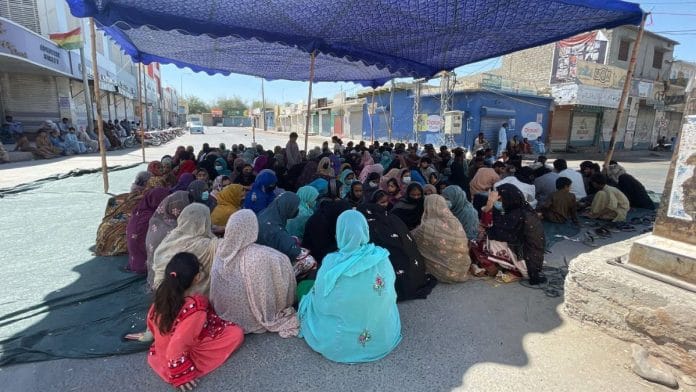New Delhi: A widespread shutter-down strike erupted across Balochistan Saturday in response to a call by the Baloch Yakjehti Committee (BYC), led by Mahrang Baloch, a democratic human rights group, following a violent police crackdown the previous day on protesters in Quetta.
The demonstrations, which have been ongoing in the region for several days, were triggered by allegations of enforced disappearances and other human rights violations committed by the Pakistani State against Baloch nationals.
Mahrang Baloch was reportedly arrested Saturday morning for organising the protests. Several other associates of BYC were also arrested by the Quetta Police and Administration, according to their social media handles. The group further alleged that the bodies of the slain youths, which had been present at the protest site, were seized by the authorities.
Meanwhile, international human rights organisations have raised concerns over the ongoing violence in Balochistan.
UN Special Rapporteur on Human Rights Defenders, Mary Lawlor, Saturday expressed concern over the reported arrests of Dr Mahrang Baloch and other activists, while the Irish human rights group Front Line Defenders called for her immediate release.
Taj Baloch, founder of the Human Rights Council Balochistan, criticised the government’s handling of the situation, saying, “This suppression is part of Pakistan’s state policy towards Balochistan. Even the BLA, which Pakistan considers an outlaw, spared women and children when they attacked forces—whether in military camps or the recent Jaffar Express incident.”
He told ThePrint, “While on one hand, the State considers Mahrang and other protesters against the Baloch genocide to be collaborators of the BLA, by these actions, the state itself is legitimising the BLA’s claim of being the representative of the people.”
Unrest & protests over enforced disappearances
BYC members staged a peaceful sit-in protest Friday near the University of Balochistan, demanding the release of Baloch activists allegedly abducted by the state, Dawn reported. The protest was met with brute force by the police, who deployed tear gas, water cannons, and fired blank shots to disperse the demonstrators. The police action resulted in the deaths of three individuals, according to the BYC, while 13 others sustained injuries. The Balochistan government reported injuries to 10 of its personnel, including a policewoman.
In a statement issued late Friday night, Dr Mahrang Baloch, the chief organiser of the BYC, announced a province-wide strike in retaliation for what she called “state violence”. The call for the shutdown was swiftly followed by reports of closed shops and blocked roads in major cities across Balochistan, including Chagai, Khuzdar, Washuk and Surab.
Protests also erupted in Mastung, Dera Murad Jamali, and Turbat, with demonstrators blocking roads and burning tyres in defiance of the authorities. In some areas, such as Turbat, gunshots were fired at protesters, injuring two children, according to a Dawn report.
Authorities responded to the protests by further restricting communication. Mobile services in Quetta have been suspended since Friday evening, and data services were reportedly cut off Thursday. However, no official announcement has been made regarding the suspension of services.
The situation escalated Saturday morning when security forces carried out a pre-dawn raid on the ongoing sit-in in Quetta. BYC members claim that police forcibly seized the bodies of those killed during the crackdown, which had been brought to the protest for funeral prayers. Videos shared by the group show police dragging away women and arresting several protesters, including Dr Mahrang Baloch.
Missing people & dead bodies
The protests, which initially began over the abductions of several Baloch activists, have intensified in recent days due to the increasing number of alleged enforced disappearances. Activists claim that thousands of Baloch nationals have been abducted by the military or intelligence agencies in recent years, with many still missing. As a result, morgues in the region have become focal points of tension, as families of the disappeared fear their loved ones’ bodies may be among the unidentified corpses.
BYC members had attempted to visit the morgues in Quetta to determine whether the bodies of missing individuals were among those recovered by authorities. However, they were reportedly denied access, prompting further outrage and the eventual seizure of the bodies by protesters. The government insists that the bodies removed from the morgue belonged to members of the Baloch Liberation Army (BLA), a separatist group engaged in an armed rebellion against Pakistan.
In response to the crackdown, the Balochistan Bar Council condemned the use of force and announced a boycott of court proceedings across the province. “The incompetent provincial government of the PPP has set the worst example of dictatorship by using coercion and power to extend its rule,” the statement read.
The Pakistan Tehreek-e-Insaf (PTI) party also condemned the police action, labelling it an “excessive and brutal use of force” against peaceful protesters.
Meanwhile, Niaz Baloch, Coordinator of the Baloch National Movement (BNM) Foreign Department, on Saturday addressed the alarming human rights situation in Balochistan at the 58th Session of the United Nations Human Rights Council (UNHRC) in Geneva.
He highlighted the recent disappearances of social activists such as Beeberg Zehri, a Central Committee member of the Baloch Yakjehti Committee, and his brother, Hammal Zehri, a scientist.
BNM and other Baloch nationalist groups continue to accuse the Pakistani government of using enforced disappearances, targeted killings, and intimidation to silence activists and human rights defenders in the region.
“Enforced disappearances have become a systematic tool of oppression in Balochistan,” Niaz Baloch said.
(Edited by Radifah Kabir)
Also Read: Train hijack by Baloch insurgents in Pakistan holds critical lesson—railways can drive geopolitics






